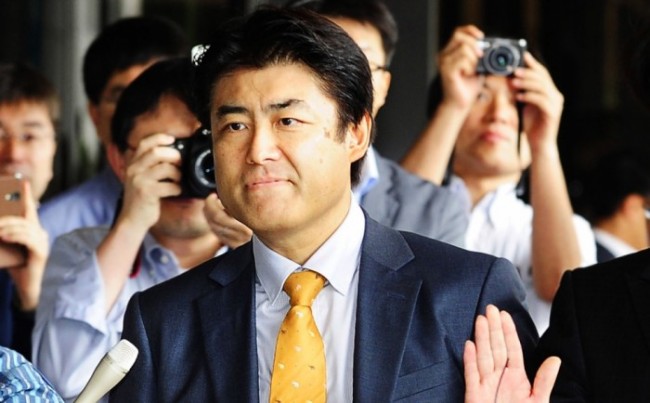by REERA YOO
South Korean prosecutors indicted a Japanese reporter Wednesday on charges of defaming President Park Geun-hye by reporting rumors about her personal life and whereabouts during the April ferry disaster, the Associated Press reported.
Tatsuya Kato, 48-year-old former Seoul bureau chief of Japan’s Sankei Shimbum, posted an article on Aug. 3, citing a Chosun Ilbo column and rumors circulated in the Korea’s financial industry. The report said Park was absent for seven hours during the Sewol ferry disaster because she was with an unidentified man in an alleged secret meeting.
The presidential office denied the newspaper’s claim and said Park “was inside the presidential compound” during the incident.
“The indictment was made on the grounds that the article, written based on false facts, allegedly defamed (Park’s) reputation by indicating without any proof that the female president had improper relations (with an unidentified man),” the South Korean prosecution said.
According to Yonhap, the prosecution questioned Kato three times since the story ran and charged him after concluding that his report was false. The Japanese journalist has not been arrested, but he has been banned from leaving the country for the duration of the investigation, despite being transferred out of his bureau chief position.
Since the beginning of the investigation, the media and public have criticized South Korea’s press freedom. Japanese Foreign Minister Fumio Kishida expressed concerns over the indictment as well as the viewpoint of freedom of speech and bilateral relations. Japan’s Chief Cabinet Secretary Yoshihide Suga also said at a briefing in Tokyo that the indictment showed that South Korea is “far apart from international norms on press freedom,” reported the Wall Street Journal.
In addition, Sankei president Takamitsu Kumasaka demanded the indictment to be retracted as soon as possible.
“It is a serious and clear violation to the freedom of speech guaranteed by the constitution not only of South Korea but also of Japan and any other democratic nation,” he said in a statement.
Meanwhile, U.S. State Department spokeswoman Jen Psaki said Washington was well aware of the situation and mentioned that it has previously voiced concerns about South Korean law.
South Korea is now a liberal democracy, but it has a history of military rulers who suppressed free speech through to the 1980s including Ms. Park’s father, Park Chung-hee. Under the current National Security Law, those found by the South Korean government to have criticized the country’s political leaders may be punished, according AP. If convicted, Kato can serve up to seven years in prison, the maximum penalty for online defamation.
Reporters Without Borders, a media advocacy group, noted that no action has been taken against South Korean media outlets such as the Chosun Ilbo, which originally reported on the rumors of Park’s whereabouts. The group ranked South Korea 57th out of 180 countries in its 2014 press freedom index.
“It is completely normal for news media to ask questions about the actions of politicians, including the president,” Benjamin Ismaïl, the head of the Reporters Without Borders’ Asia desk, said in a statement last month. “Vagueness about the president’s agenda during a national tragedy is clearly a subject of public interest.”
Committee to Protect Journalists (CPJ), a nonprofit that promotes press freedom worldwide, also released a statement criticizing the country’s actions and demanded the charges and travel ban against Kato to be dropped.
“Journalists should be free to report in South Korea, and even if their reporting offends powerful people, they should not face criminal charges or have their movements restricted,” said Bob Dietz, CPJ’s Asia program coordinator. “Criminalizing charges like defamation and libel run counter to the concept of a free press and have no place in a modern democracy.”
Photo courtesy of Kyodo









